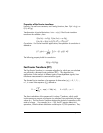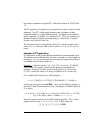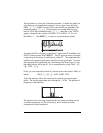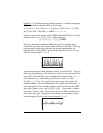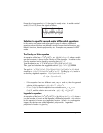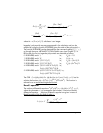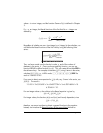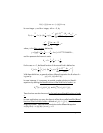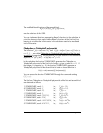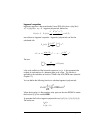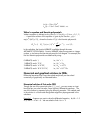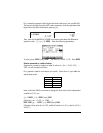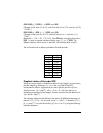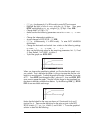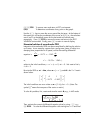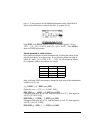
Page 16-55
The modified Bessel functions of the second kind,
K
ν
(x) = (π/2)⋅[I
-ν
(x)−I
ν
(x)]/sin νπ,
are also solutions of this ODE.
You can implement functions representing Bessel’s functions in the calculator in
a similar manner to that used to define Bessel’s functions of the first kind, but
keeping in mind that the infinite series in the calculator need to be translated
into a finite series.
Chebyshev or Tchebycheff polynomials
The functions T
n
(x) = cos(n⋅cos
-1
x), and U
n
(x) = sin[(n+1) cos
-1
x]/(1-x
2
)
1/2
,
n = 0, 1, … are called Chebyshev or Tchebycheff polynomials of the first and
second kind, respectively. The polynomials Tn(x) are solutions of the differential
equation (1-x
2
)⋅(d
2
y/dx
2
) − x⋅ (dy/dx) + n
2
⋅y = 0.
In the calculator the function TCHEBYCHEFF generates the Chebyshev or
Tchebycheff polynomial of the first kind of order n, given a value of n > 0. If
the integer n is negative (n < 0), the function TCHEBYCHEFF generates a
Tchebycheff polynomial of the second kind of order n whose definition is
U
n
(x) = sin(n⋅arccos(x))/sin(arccos(x)).
You can access the function TCHEBYCHEFF through the command catalog
(‚N).
The first four Chebyshev or Tchebycheff polynomials of the first and second kind
are obtained as follows:
0 TCHEBYCHEFF, result: 1, i.e., T
0
(x) = 1.0.
-0 TCHEBYCHEFF, result: 1, i.e., U
0
(x) = 1.0.
1 TCHEBYCHEFF, result: ‘X’, i.e., T
1
(x) = x.
-1 TCHEBYCHEFF, result: 1, i.e., U
1
(x) =1.0.
2 TCHEBYCHEFF, result: ‘2*X^2-1, i.e., T
2
(x) =2x
2
-1.
-2 TCHEBYCHEFF, result: ‘2*X’, i.e., U
2
(x) =2x.
3 TCHEBYCHEFF, result: ‘4*X^3-3*X’, i.e., T
3
(x) = 4x
3
-3x.
-3 TCHEBYCHEFF, result: ‘4*X^2-1’, i.e., U
3
(x) = 4x
2
-1.



